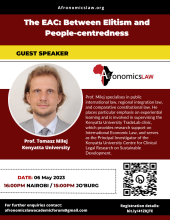The Kenya/US Strategic Trade Agreement Needs to Be Negotiated with Transparency Not Urgency
From September 16-27, 2024, U.S. and Kenyan negotiators held their eighth negotiating round of the US/Kenya Strategic Trade and Investment Partnership in Washington DC. The trade talks for a stand-alone Free Trade Agreement kicked off under the Trump and Kenyatta administrations following an August 2018 meeting of the two Presidents. The Biden administration relaunched the negotiations in July 2022. At the time, the Biden Administration identified protecting American firms in its new industrial policy of increasing manufacturing to counter China. It also sought access to the Kenyan market for American genetically modified crops and dealing with corruption to ensure transparency in public procurement for American businesses as key objectives. In the meantime, President William Ruto, who was elected as Kenya’s fifth President in August 2022, continued pursuing a trade deal with the U.S. with zeal.

